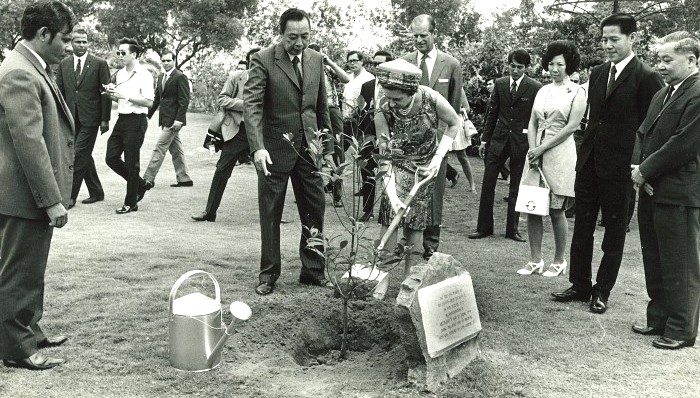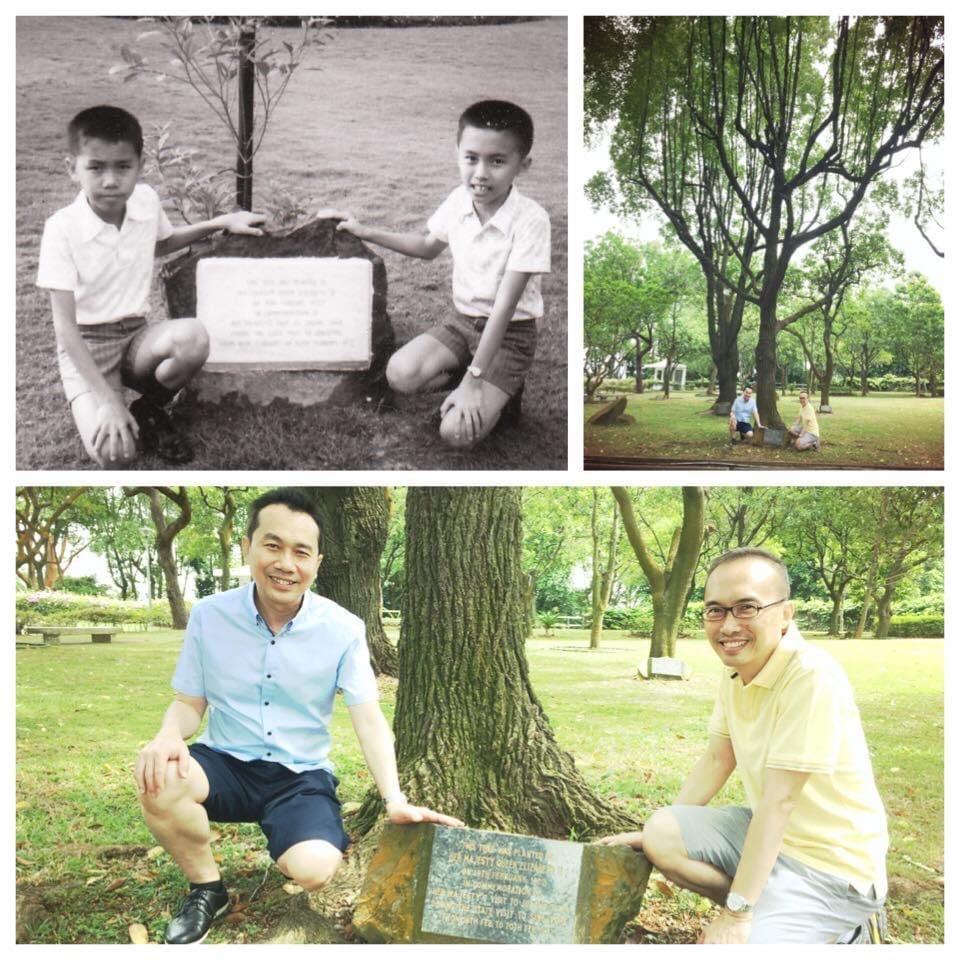What a humble sapling taught me about the late Queen Elizabeth II and how she lived out her calling
Elder Jimmy Tan // September 16, 2022, 4:53 pm

"I planted the seed, Apollos watered it, but God has been making it grow." Taking reference from 1 Corinthians 3:6, this sapling planted by the late Queen Elizabeth II in 1972 holds special meaning for the author. He reflects on the late Queen's legacy and devotion to her King. Photo by JTC on medium.com.
This past week, the larger-than-life passing of Queen Elizabeth II has all but hijacked the media. Tributes have been pouring in as quickly and profusely as the flowers laid between Balmoral Castle and Buckingham Palace from all corners of the globe, almost eclipsing the war in Ukraine and ongoing economic woes.
I was having dinner with some church members on the day Queen Elizabeth II died. The conversation at the table inevitably went to the news of her passing.
Two young adults at my table sheepishly admitted they honestly had no feelings about it as they had no connection with her.
I began to see her as a sister-in-Christ who sought to live out God’s will till the very end.
Somewhat older, I grew up being exposed to the occasional news about her, and, with the rise of the paparazzi, much gossip surrounding members of the royals. And I was not immune to cynicism, hearing about all the unsavoury drama playing out of the House of Windsor.
Yet in the last decade, I started paying attention to the Queen’s traditional Christmas addresses after my fellow Elder and historian Dr Ernest Chew forwarded me one such clip.
I found myself drawn to how she endeavoured, like a good shepherd, to bring her subjects together and how she also spoke publicly about her faith in Christ.
Her voice and manner were not particularly commanding or rousing for a world used to charisma. But how she put words to express her convictions piqued my interest. Here was someone who courageously and steadily testified for her King.
I began to see her as a sister-in-Christ who sought to navigate and live out God’s will as it unfolded daily, as the times and seasons changed, till the very end of her 70-year reign.
I had never seen her in person, so what lessons could I come away with from observing one destined to reign and already so well feted by millions over the world? In my mind, at least two.
A symbol of power who chose to serve
While her constitutional role was limited, the Queen never let it be perfunctory.
While she had no political power, she realised early on that God had given her a power for good, as His uniquely positioned ‘salt and light’.
Unlike many present-day celebrities, world leaders or influencers, the Queen stayed clear of frivolous self-serving media. Instead, she judiciously directed her energies to stewarding the routines that came with reigning.
God knew what lay deep in the Queen’s heart and was pleased to keep His end of the deal.
Simply put, the Queen, while doubtlessly well-endowed materially and well-served by her many servants, made it her goal to serve.
While another royal with a different personality may have done things differently, one bedrock of the Queen’s annual schedule saw her take to the media to serve her people.
Besides and before the annual Christmas addresses from 1953, her very first radio broadcast was at the age of 14 when Britain was in the throes of World War 2. In 2020, a pandemic-wearied UK drew comfort again from her specially televised address.
By the time of her last overseas trip in 2015, the then 89-year-old monarch had travelled the globe more than any of her predecessors (or other statesmen, for that matter) ever did to touch base with her realms as her nation’s chief ambassador.
We have also heard how, back in her palace, she diligently prepared for and met every prime minister under her reign for their weekly work briefings.
All this on top of the ribbons to cut, wreathes to lay, charities to patronise, speeches to give and untold numbers of hands to shake – celebrity or commoner.
She indeed made good her promise on her 21st birthday, when she said: “I declare before you all that my whole life whether it be long or short shall be devoted to your service, and the service of our great imperial family to which we all belong.”
God knew what lay deep in her heart and was pleased to keep His end of the deal. For surely, there must have been challenges.
For instance, how did this relatively introverted Queen cope with public expectation next to her more outgoing sister Princess Margaret?
Or how did she overcome the obvious age and experience gap staring her in the face when she worked with the towering giant of a leader, Sir Winston Churchill?
And was she ever tempted to assign another to meet some dignitary she knew she wouldn’t enjoy meeting? For who would not sympathise if she did?
There was no slowing down in the things she knew she had to do as Queen, like seeing one prime minister out and inviting another in to form the government in what was to be her final days.
I like how a text circulating on social media, whose author is unknown to me, put it: “The Queen must already have been feeling gravely sick, but the ceremony of ‘kissing hands’ could only be done in person. So she got up, put on her clothes, went out, met her prime ministers (both Boris Johnson and Liz Truss), shook hands, smiled for the cameras. 48 hours later, she passed away. To the very end, Queen Elizabeth II did her duty.”
Being faithful in the little never goes out of style.
We rightly marvel at her unflinching devotion. Yet even if she didn’t get up to see PM Liz Truss that morning, I suspect no one would have accorded her any less respect. But I forget she wasn’t doing it for anyone else but God and country, and that this is what dying to oneself daily looked like for her.
Is there something we need to keep doing despite our own personality, preference or comfort zone? What has God placed in your hand as a divine opportunity to shine for Him, just by being faithfully dutiful?
It could be visiting someone who is homebound, saying hello to that quiet individual, shaking hands with congregants as they leave after service, or hosting someone new to a meal. Or it could be doing something tediously administrative and hidden.
After 70 years of one example of a life, we now have one less excuse to balk at such routines.
Like our Lord Jesus, Queen Elizabeth wisely demonstrated a simple truth – there is no substitute to being present, for there is great encouragement to others when we simply show up – whatever the call of duty beckons us to do. Being faithful in the little never goes out of style.
We don’t wait for that perfect role, mood or time. When we are led by Him, we paradoxically experience the freedom of His restedness and affirmation.
The fruit of patient endurance
The first two seasons of the Netflix series The Crown illustrated for me the long-term impact of the Queen’s life on her nation, prime minister after prime minister.
But it was something she did at Jurong Hill (yes, Jurong in Singapore) that brought this lesson home for me. Jurong Hill was an early key stop and vantage point for visiting dignitaries to see, with their own eyes, our country’s evidence of heady economic progress, Jurong Industrial Estate.
The Queen had planted a Tembusu tree there in 1972 during her first visit to Singapore, a slender sapling which my brother and I posed beside as kids one weekend when our parents took us there.
In 2015, we found ourselves back at Jurong Hill after 43 years. It was to shoot our 30 seconds of fame as part of an SG50 project by filmmaker Royston Tan.

Eld Jimmy (right) and his brother were amazed to see how much the Tembusu sapling, planted by the Queen 43 years ago, had grown. Photo courtesy of Eld Jimmy Tan.
We decided to track that tree down and attempt a then-and-now picture. We were amazed. That same Tembusu sapling is now all grown.
If not for the accompanying plaque, I would not have recognised it, for we had not been keeping track of this tree’s growth. But someone clearly did. During all that time, NParks and its predecessors must have done the good job of watering, fertilising and pruning it.
The Queen planted. Singapore watered. But God gave the growth.
That tree’s growth reminded me of how God usually works. We are faithfully called to plant or tend to whatever He assigns us. Day after day, year after year and sometimes, even decade after decade. Along the way we may even ‘lose track of tracking’, but we know He does not.
It’s a good kind of forgetfulness, I think. For aren’t we tempted to cave in too quickly at the first signs of failure, changing trends or to some inner need to bolster a false sense of worth?
Are you feeling discouraged or bogged down by wearying aspects of work or ministry or the seeming lack of fruit? Some things in God’s economy are perhaps only meant to be noticed after “43 years”.
Sometimes, character transformation is noticeable in a graciously shorter time. But often, fruit only ripens after we experience what Scripture calls “patient endurance” (Hebrews 10:36). And there is no shortcut there.
Wherever we are called to serve, market place or ministry, it is easy to make premature evaluations when there is pressure to perform or deliver. But we ought to be aware that we are a society long steeped in the culture of “instant everything”.
A Queen who lived as a citizen of the Kingdom
I suspect the Queen learnt this sometime during her long reign.
Instead of begrudging her fate when her father had to suddenly take the reins of ruling the nation or when she herself was thrown into the spotlight after her father’s premature death, she must have often cried out to her Lord for supernatural support.
Kingdom citizens all march to a different beat – that of the King of kings.
His grace to her is evident now – in perfect 20-20 hindsight – but I am sure she simply focussed on her duty to serve and be an example to others, despite times of personal or national crises.
She exemplified Galatians 6:9 – she was not weary of doing good, and looked forward to the proper time to reap a harvest.
As we bid “till we meet again” to the Queen, we remember that Kingdom citizens all march to a different beat – that of the King of kings.
Just August this year, the Queen had paid tribute to her King: “Throughout my life, the message and teachings of Christ have been my guide and in them I find hope.”
In her many Christmas addresses, she had often testified to what her beloved Jesus, the Child of Bethlehem, meant to her: “For me, the life of Jesus Christ, the Prince of Peace is an inspiration and an anchor in my life.”
May we too be inspired to live well for our King.
RELATED ARTICLES:
God saved the Queen: The enduring faith of the late Queen Elizabeth II
We are an independent, non-profit organisation that relies on the generosity of our readers, such as yourself, to continue serving the kingdom. Every dollar donated goes directly back into our editorial coverage.
Would you consider partnering with us in our kingdom work by supporting us financially, either as a one-off donation, or a recurring pledge?
Support Salt&Light



